R. Shea Brewing Co. launches GoFundMe to save Canal Place production brewery
Ron Shea’s chemistry degree balances each craft beer recipe. But his math degree tells him he needs $2.3 million or his production brewery in Canal Place will not survive.
Ballooning interest on a Small Business Administration loan taken out to open R. Shea Brewing Co.'s downtown Akron location, combined with rising wages, skyrocketing prices for supplies and changing consumer tastes, are putting the popular brewery's future in jeopardy.
“We’re kind of at the point now where we pay the Small Business Administration loan or we pay the rent and utilities. But we can’t pay both,” Shea said Sunday, explaining that his operation will be insolvent by the first quarter of 2024 without intervention.
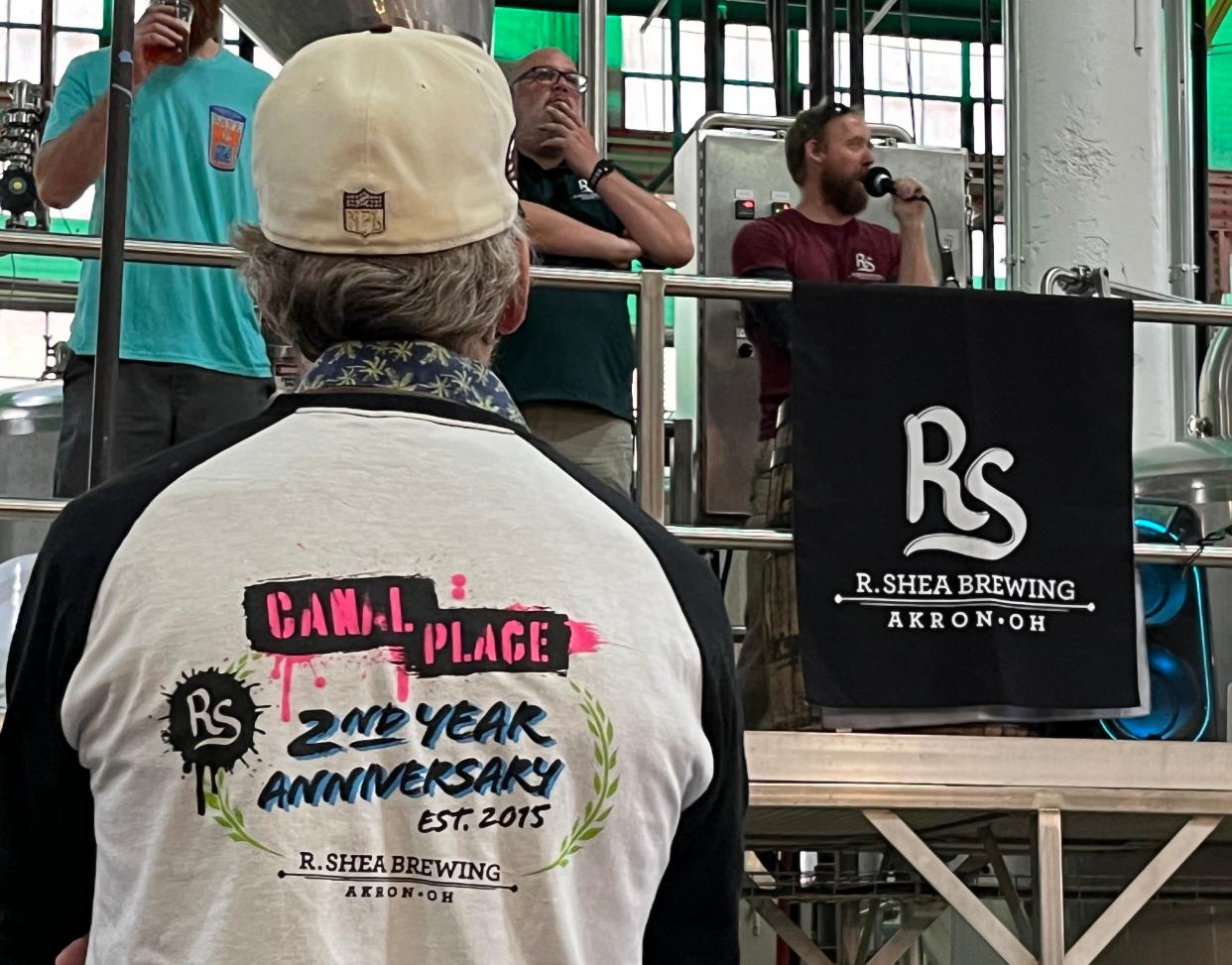
The co-founder of R. Shea Brewing Co. stood with his general manager and head of sales, their backs to a row of fermentation tanks and 250 loyal fans gathered below them for a rally to save the business. As he delivered the line about struggling to pay the bills, football fans cheered a play on the television screens in the packed upstairs taproom.
This might not be a “cheerable” moment, Shea said, trying to make light of a serious situation.
Fans attending the emergency town hall meeting at the Akron brewery said their fine-tuned tastebuds are settled only by the sharp flavors of R. Shea’s pours and pounders. But Shea explained that it’s gotten too expensive to keep them satisfied.
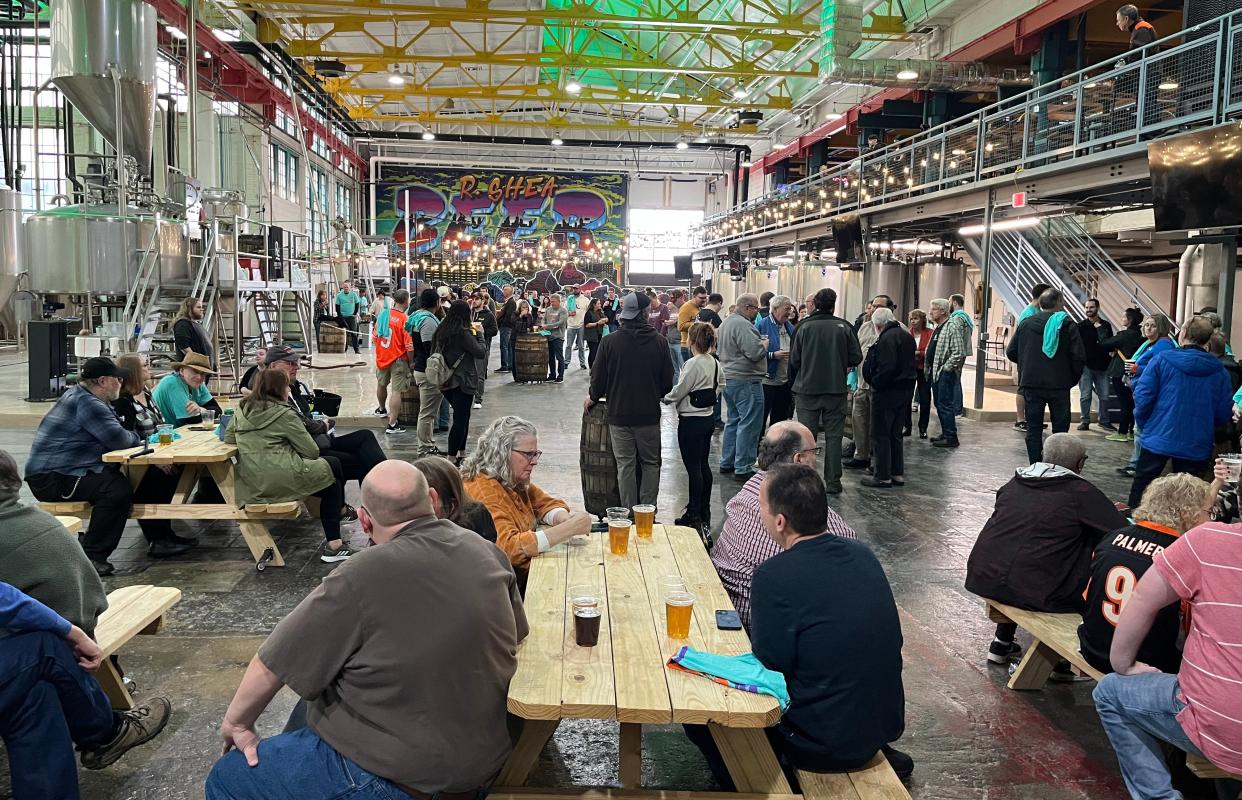
Inflation is pushing up wages and material costs for everything from hops and grain to the eclectic ingredients of his fermented offerings. Interest on the $2 million SBA-backed loan he took out in 2019 to build a production brewery and eatery in 60,000 square feet of former B.F. Goodrich factory has gone from 7% to 11%. The lender will no longer accept interest-only payments, which kept Shea's and other businesses afloat during the pandemic.
And the interest alone is now $7,000 more a month due to rising rates, Shea said Sunday.
Shea’s dire financial straits come three years after his expansion into beer can distribution, which launched at the worst possible time just two weeks before the pandemic hit. With consumer patterns shifting, sales are now suffering across the board in an industry oversaturated with craft brewers.
So, Shea called his friends and fans to the downtown brewery Sunday, seeking “an army” for his 60-day fundraising campaign. Attendees put on powder blue T-shirts passed out to show support and a "Help Save R. Shea Brewing" GoFundMe page went live Sunday evening.
Shea is hoping the sense of community his company has fostered will carry his business through these dark times. He’s got a lot riding on their support, including his house, which is listed as collateral on the SBA loan.
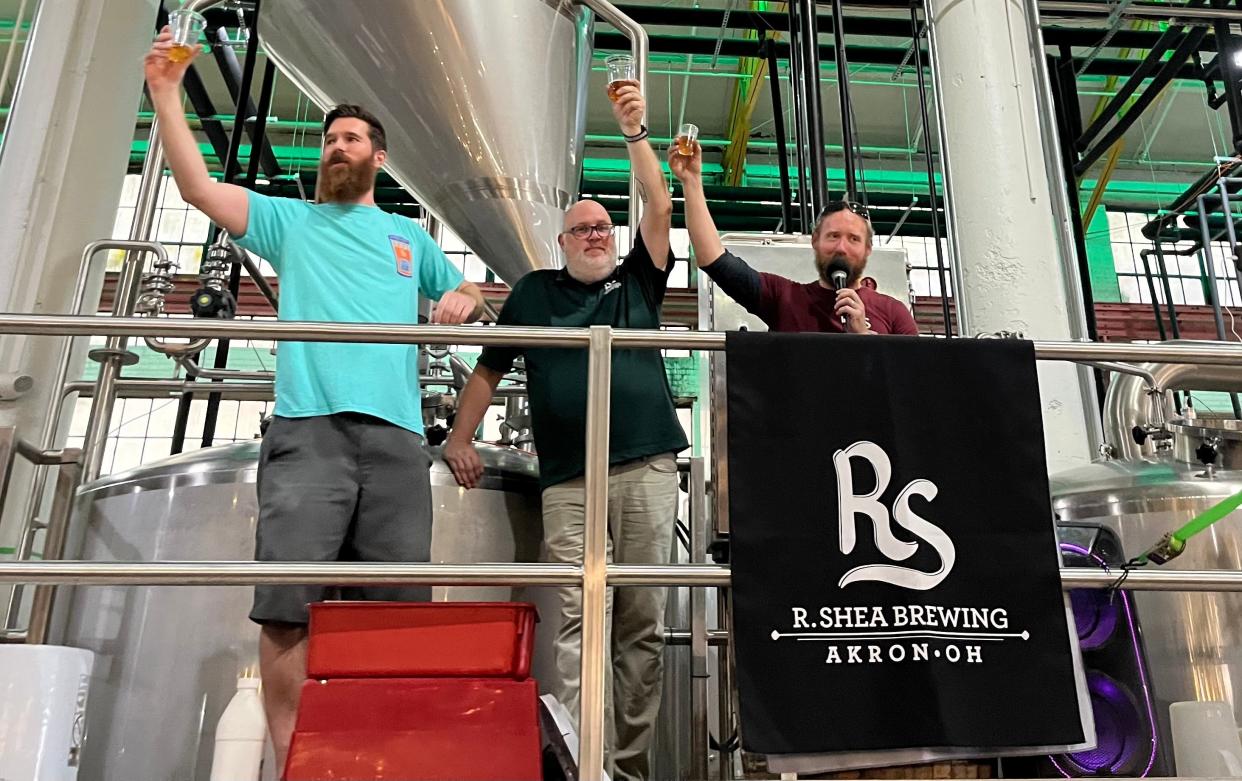
He might be able to “kick the can down the road” for a couple years with no help, he told the crowd, but the writing is on the wall. Every $250,000 raised would buy him another year in operation, he told the Beacon Journal after the event. Raising all $2.3 million would pay off the $1.6 million balance on the government-backed loan and other private debt from the $2.7 million expansion at Canal Place.
“We’re not going to sell out,” Shea told the crowd, dismissing the notion with the wave of his hand. “That’s not going to happen.”
Worst case scenario, he said after the public event, he would lease or run the Canal Place production brewery for someone else while scaling back to his Merriman Valley location, which opened in 2015 and is under renovation.
Either way, R. Shea Brewing Co.’s future now rests with persnickety consumers who endorse the brewery’s future with each pint they order, each friend they refer to the fundraising campaign and each demand for their favorite beer to be sold at their local bars and stores.
The GoFundMe page lists tiered packages of perks depending on donor support, starting with first dibs on new releases and $5 full pours for a year for $150 donors, all the way up to a $10,000 corporate sponsorship earning five free uses of the brewery floor for events and a plaque with the donating company's name hung for life in the Canal Place location.
A popular beer
Shea’s brews have received critical and popular acclaim. His Orange Mango Citra Shandy, Fluffernutter and Shandy Isles took the People’s Choice award three years in a row. Shea was ready to defend the title in 2020 when the Art & Ale event in late March became one of the first casualties of a pandemic that knocked many craft brewers for a loop.
Their taprooms emptied, pushing their product to stores with customers initially unwilling to peruse overstocked beer isles. Shea was ready to start distributing two weeks before the government shut everything down.
Three weeks into the chaos, Shea’s team started churning out orders, releasing COVID-19 fan favorites like a double New England IPA called Normality and a sour imperial gose called GOSE Into Effect Until. Shea dubbed the gose, fermented with sweet cherry, pineapple and tangerine and aged with Madagascar vanilla beans, the “fruit salad of beers.”
After Shea announced the $2.3 million capital campaign, an attendee during the question-and-answer session asked the brewer what sets his craft apart from the ever-growing options in today’s world of niche breweries.
“Good beer!” a loyal customer yelled before Shea could answer.
“Testify! Testify!” another man added.
From double New England IPAs to stouts and barrel-aged beers, Shea is a stickler for delivering perfection on extraordinary recipes — his latest the Maple Mashed Sweet Potato, a pastry milk stout.
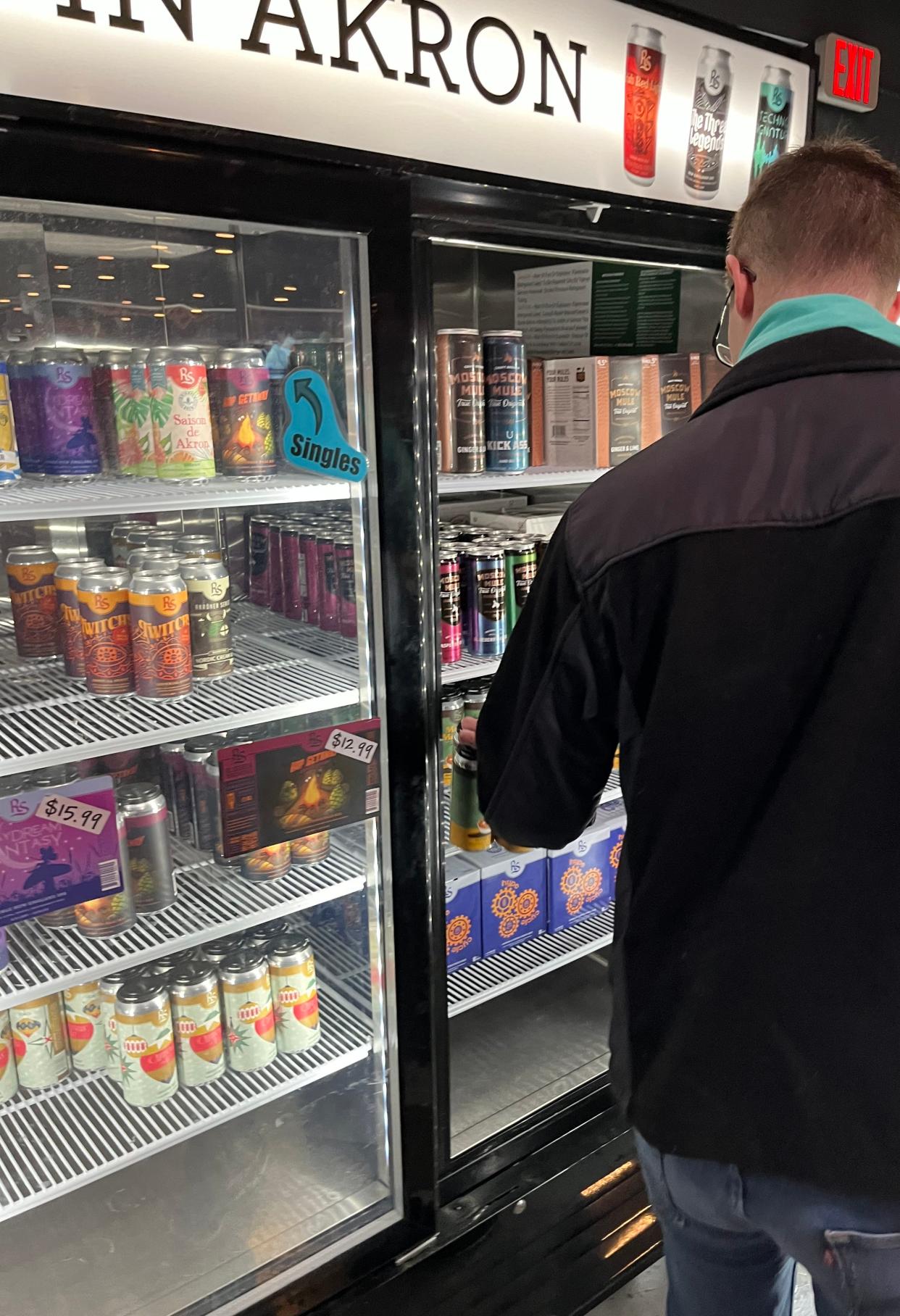
“We do flavors exceptionally well,” Shea told his diehard fans. “Whatever it says you should taste on the can is what you should taste.”
“They always have something I want,” said Brian Keffer, a stout drinker who poured praise on Shea’s staff at the taproom in Canal Place. “Here, I like the food even better. And I like the service. I walk in and they know what I want. It’s more of a family thing.”
“He puts his formulas to use. And the guys who work down here on the brew floor are as particular as he is,” said his dad, Ron Shea Sr., who had no clue his son would announce that his business is just months aways from insolvency.
The crowd called Shea and his staff “second-to-none” artists who “treasure that beer.” But they recognize that there will be casualties in the oversaturated, competitive world of craft brewers.
“You have to separate yourself,” said Keffer, who believes Shea has done so on flavor, if not sales.
Craft brewery saturation catches up with mid-sized brewer
When a 400th craft brewer, Guernsey Brewhouse in Cambridge, got its state permit last year, the Ohio Craft Brewers Association celebrated the milestone with a stunning fact: nearly two in five breweries in operation opened in the past three years. By the end of 2022, the association reported that 420 craft brewers generated $1.27 billion in business for Ohio.
In 2015 when Shea opened his micro-brewery in the Merriman Valley, he was sharing the Greater Akron market with Thirsty Dog and Hopping Frog in 2015. The next year, his was among 12 stops that lined the Summit Brew Path, which grew to 22 stops in 2019 after the openings of Akronym, Missing Mountain, Lock 15 and Missing Falls in 2018.
And the industry has exploded since 2019 when Shea opened his taproom and restaurant in Canal Place.
“As you may or may not know, there is a decline in the craft beer markets. And it is a nationwide trend,” Shea said Sunday before handing the microphone to Matt Cern, his head of sales.
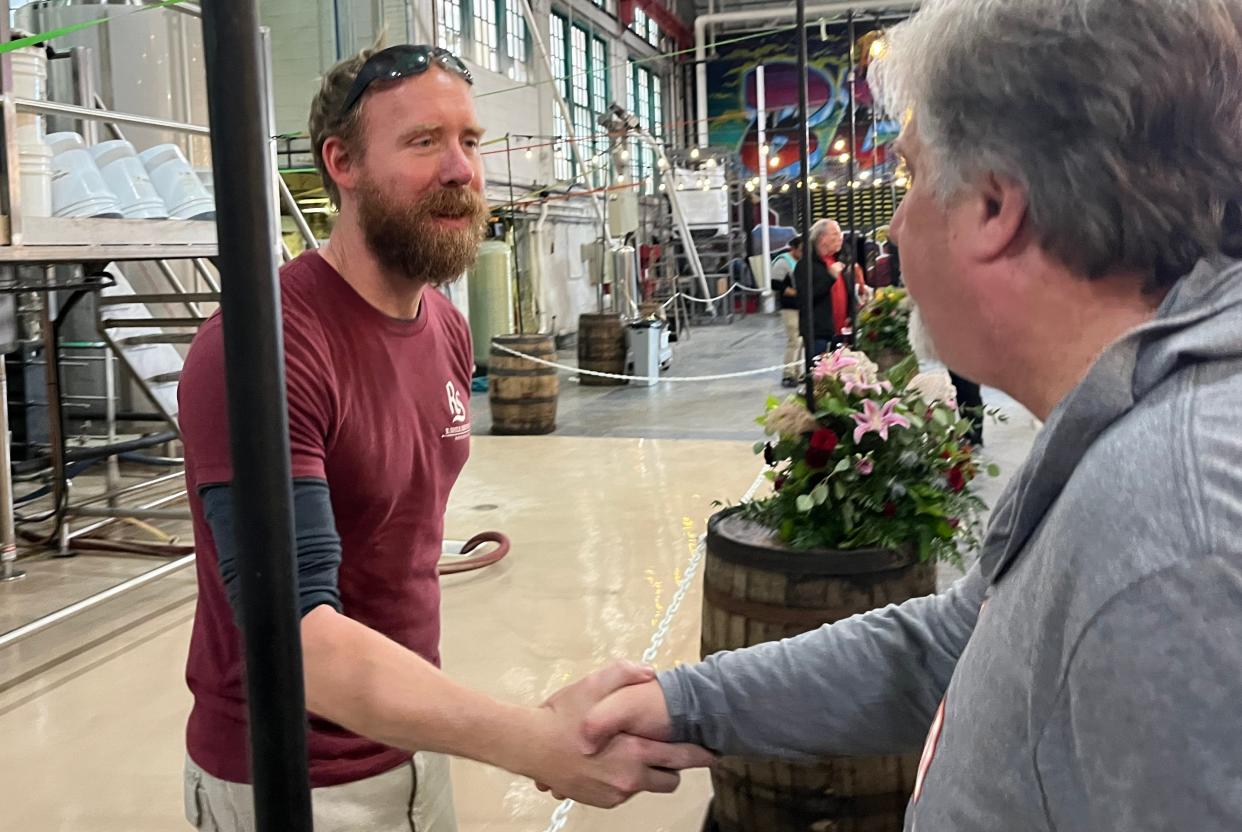
“It’s everybody across the board,” Cern said of the dip in sales. “In Ohio, it’s roughly 30 to 35% down. … Indiana is something like 60% down in craft beer sales.
“There’s a lot more craft breweries out there,” said Cern, noting that taprooms suffered from declining in-person clientele during the pandemic. “We’re no exception to that. We started distribution two weeks before the COVID shutdown. Three weeks into it, our distributor is like, ‘Guess what? You’re going statewide. Start brewing some beer.’”
Cern lamented a consumer shift toward ready-to-drink cans of margaritas, whiskey mixes and other varieties. Big-name brands like Bud Light launched their own, cheaper versions to capitalize on surging demand for hard seltzers, which has undercut the market on R. Shea’s Moscow Mule seltzers. And more people, Cern said, appear to be drinking non-alcoholic beers during the week.
R. Shea’s taproom features a guest keg of Deep Fake, an IPA with 0.5% ABV brewed by Flying Dog. Shea said he thought about making his own "NA" non-alcoholic beer. But it would take a $250,000 investment to “do it right,” he said, and time — neither of which he has at the moment.
“Big breweries — the Anheuser Busches, the Millers, all those guys — they’re going to be fine. The small breweries that don’t distribute, they’re going to be fine. All of us in the middle — and we’re one of the medium-range breweries — we’re the ones that are struggling a lot with all of this. It’s the nature of the beast.”
Distribution model pinches the underdogs
Justin Hemminger, deputy director of the Ohio Craft Brewers Association, couldn't speak to the specific financial positions of members. His organization also does not track statewide craft beer sales.
Anecdotally, though, he's not surprised.
"For the last few years, it's been really tough to make brewery growth happen in the distribution space," he said. "If your business model is based on getting cans and bottles out to retailers like grocery stores, convenience stores, it's going to be more difficult than selling pints over the bar at your own taproom. The margins are less. And if you have a deal with a distributor ... the distributor is making an additional margin off of your product."
Cern complained about R. Shea not getting the representation they need from their distributor, who determines retail shelf space for each of its client brewers. Cern and Shea said they'd like to expand distribution into the Pittsburgh and Detroit regions, but samples sent out of state haven't prompted new orders, so far.
R. Shea is also in discussion with other mid-sized brewers about possibly sharing warehouse, shipping and purchasing capacity, which could lower costs. The problem is that smaller craft beer producers can't easily get out of distribution contracts.
"When a brewery signs with a distributor, those contracts are evergreen," said Hemminger. "They can't get out of those contracts without suing their way out."
Hemminger's organization is lobbying for Senate Bill 138 and House Bill 306, which would carve out exceptions for small and independent brewers in 50-year-old state laws that govern franchise contract agreements.
Reach Doug Livingston at dlivingston@thebeaconjournal.com or 330-996-3792.
This article originally appeared on Akron Beacon Journal: R. Shea Brewing Co. starts GoFundMe to save Akron business






